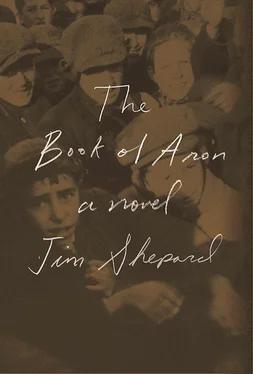“Of course we had some training,” he added when I didn’t say anything.
“You’re going to find me a bootjack,” he said a few blocks later, after he dropped me in front of my building. “I need a proper bootjack.”
“How would I know where to find a bootjack?” I asked him.
“How does one know where to find anything?” he answered. “Look around. Say hello to your father for me.” Then he flicked my nose with his finger, pushed himself off, and rode away.
GIVEN THE NEWS THAT APARTMENTS WERE GOING TO be requisitioned anyway, my father said he’d gone looking for boarders who could pay a little something, that it’d be nice if a Jew saw a herring on his table even once a week. My mother said she would only agree to it if whoever he found first went through the disinfection units and then presented her with their delousing certificates. She thought this would be the end of that problem, since the lines at those stations made you wait all day and night, but a family of four showed up the next morning and handed her their certificates one by one as they passed into our apartment carrying what they had. They were each wearing many layers, both for the cold and to make it easier to carry other things. They didn’t look clean, but as my father told her, they weren’t any dirtier than anyone else, either. “They probably bought their certificates, instead of waiting in line,” my mother said, which was what my father and I assumed, though we only shrugged.
They brought as an offering overcooked kasha with rutabaga preserves, some stuffed cabbage that was much more appetizing, and a tiny jar of honey that the father said we might want to use as barter.
He was a tall man who made jokes and his wife was short and had angry eyes and looked disappointed by everything in our apartment. She looked at our kitchen and said, “Ice in the pot, frozen faucets, and not a drop of water.” Their daughter said she was nineteen and their son said he was hungry. He was about my age. Once he was eating he told us his name was Boris.
His parents and sister took the kitchen and my mother and father were in the bedroom so the rest of us slept in the hall. It was even colder there. His feet were in my face. In the middle of the night he seemed to know that I was still awake and started talking in a low voice. He said his family had taken over the previous apartment they’d been in, that they’d just stormed the place with another family. Then it had been taken away from them by the Germans. He said in the shelter at the synagogue all of the boys stole bread from one another’s families, and what they didn’t eat they traded for horseshoe spikes they used in games. He said he’d gotten the honey outside the ghetto when an O.D. man had turned his back and pretended not to see him coming or going. I asked what an O.D. man was and it turned out that’s what he called the yellow police, because of the German name for them, Ordnungsdienst, the Order Service. After we listened to my brothers snore he asked if I thought he looked strong.
“Are you talking to me?” I asked. He said he was. He asked again if I thought he looked strong. I told him I guessed so.
He said that that was because he was. “Smugglers eat more than other people because they work harder,” he said. His cheeks had the pockmarks from chicken pox and he had an expression like he was sharing the floor with a sick person.
I told him smugglers didn’t usually tell everyone that they were smugglers, and he snorted. “I don’t think you’re Gestapo,” he said.
“You never know,” I told him.
He asked how long we’d lived there. He said he’d hated his village and that when he and his friends trampled their neighbor’s vegetable garden the neighbor had come out of his house and tried to beat them with a leather strap. Then he turned loose his dog, who bit them. Dogs hate the poor, he added, thinking about it further. He talked with his hands, like a Jew.
He said he’d been thrown out of the Polish Scouting Association after being told that as a Jew he couldn’t be sworn in on a Christian Bible and he suggested to his troop leader that they use a spare-parts catalog instead. He said his only real friend hadn’t shown up to say goodbye on the day he left. He said all of this gave him an advantage because he never felt homesick. And it was better to have no one to miss.
He said his father had a weakness for the bottle and I’d probably already noticed that he never refused a toast. “And why should he?” he asked.
If he was waiting for an argument, he didn’t get one from me. “You’re soon going to have trouble with my mother, too,” he told me. He said it was never long before she was sure she was being cheated and that’s why she was always shouting at someone. I asked if we were going to have trouble with his sister, too, and he said she was so shy she’d told him that if she ever got married she wanted it to be in a cellar where no one would see.
I asked what happened to his sister’s hand and he said that on the way to Warsaw his father had let him take the reins of the wagon and that he had steered the thing so badly when crossing a bridge that he’d turned them over in a ditch.
I asked how they’d managed to get the wagon back on its wheels and he said he told people stories like that because he thought it was important to be clear in your own head on what you could and couldn’t do and this was how he’d grown up to be someone with open eyes. Inasmuch as he’d grown up at all, I said, and he told me he’d show me how much he’d grown up the next chance he got.
I told our group about him and repeated some of his stories and Lutek said I should bring him along tomorrow. Adina wanted to know why and he said she shouldn’t worry about it, since Sh’maya’s friend Boris probably wasn’t going to survive long anyway, given what we were up to.
“Why’re you calling me that?” I asked.
“Isn’t that what your brothers call you?” he said.
When everyone was asleep that night, I told Boris he should come meet the group. He said he looked forward to becoming our leader. I told him that as far as he was concerned school was starting once the sun came up the next morning, so he should get some rest.
MY MOTHER AND FATHER WERE UPSET BY THE NEWS that the three trolley lines for the Jews were going to be shut down and in the worst part of the winter. My mother asked why she had to live to see such awful years and my father told her there were probably worse years to come. The trolley lines were to be replaced with just one that was given no number but only a shield with the Star of David. Lutek said our bigger worry was that they would stop running the Aryan trolleys through the ghetto, and a month later they did.
There was no announcement so we waited for three days before figuring that out for ourselves. Then Zofia asked what we would do now and Boris said we could start by not playing so nice. To show us what he meant he went along when Lutek delivered our last sack from off the trolley and told the men who’d ordered it that they couldn’t have it until we got more money.
“We agreed to what we agreed to,” one of them told him.
“ They agreed to it. I didn’t agree to it,” he said and Lutek told us they went back and forth about it and the men made some threats but eventually got scared by all the patrols coming and going. He said Boris held everyone up like he didn’t even notice the police until he got what he wanted: not only an extra bag of potatoes but also some raisin wine. He shared both with the rest of us.
AT DINNER MY FATHER TOLD US IT SEEMED LIKE NO matter where he went, German soldiers followed. My mother got alarmed and asked why and he said he had no idea.
Boris’s family was in the back room talking in low voices, and my father said, “Maybe they’re planning a coup.”
Читать дальше












